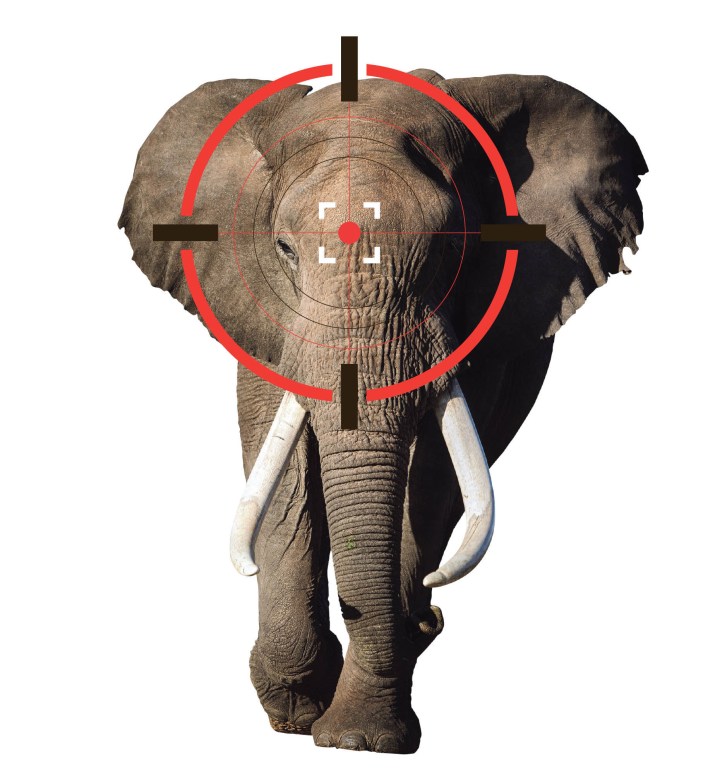HUMAN-WILDLIFE CONFLICT
Paradise in the crosshairs – bandits, elephant poachers threaten to kill ecotourism in KZN’s Jozini

Tourism is under threat in the once-tranquil Jozini region of KwaZulu-Natal, with bookings cancelled after criminals shot at foreign visitors amid conflict between villagers and roaming elephants.
For decades the area surrounding the serene and picturesque Jozini Dam and Pongola Nature Reserve has been a tourist mecca, drawing well-heeled local and international visitors keen on seeing nature at its best, including cruises to watch elephants grazing and to spot rare species.
Luxury lodges and hundreds of workers depend on the viability of the local tourist attractions and a constant stream of high-spending visitors.
But now the survival of this ecotourism industry is in jeopardy because of growing armed banditry by poachers who kill elephants for their tusks and catch endangered tiger fish with gillnets. To add to the problems, local residents have vowed to kill the elephants, which they accuse of killing and threatening their livestock.
Environmental Affairs Minister Barbara Creecy said authorities believed that the area and other game reserves in northern KwaZulu-Natal had become softer targets for poaching syndicates because of anti-poaching efforts in the Kruger National Park and other poaching hot spots.
The latest attack, widely reported locally and internationally, occurred in January when armed bandits attacked a tourist boat. The tourists – five Germans, two Americans, one Australian and four South Africans – were on a cruise on the Jozini Dam.
Read in Daily Maverick: “Jozini Dam: Twenty-five slaughtered elephants later, tourists in a viewing boat come under poachers’ gunfire”
The incident was condemned by Tourism Minister Lindiwe Sisulu, who described it as “grave” and added that her department was “working with the law enforcement and other agencies to ensure the safety of tourists in the country”.
The attack followed the killing of more than 25 elephants whose tusks had been cut off.
When DM168 visited the villages of eGalweni, eMpondweni and eMombeni, tensions were still high and many conservationists and local residents were not willing to speak on the record, with some saying they feared being attacked.
Those in the tourism industry feared that, if attacks, poaching and other incidents continued, they would lose their livelihood.
Problems began years ago. Locals say that in about 2012 the fence of the Pongola Nature Reserve – which is run by Ezemvelo KZN Wildlife – was vandalised and stolen. After that, villagers’ cattle could graze in the reserve and people could fetch wood there.
The area is a tourist paradise, with the serene Jozini Dam, caves and a mountain lookout point where you can see South Africa, Swaziland and Mozambique. The grave of the Zulu king Dingane, who reigned from 1828 to 1840, is also in the region.
Other attractions include the Border Cave on the western escarpment of the Lebombo Mountains, which has a record of occupation spanning about 200,000 years. The cave was made famous by the discovery of the “Lebombo Bone”, the oldest known artefact to have been used as a counting tool. Dating back 35,000 years, it is a piece of baboon fibula scored with 29 notches.
Read in Daily Maverick: “Wanted — a new home for up to 50 wandering African elephants”
A herd of elephants crossed into the nature reserve from a private game reserve in about 2015. Ezemvelo KZN Wildlife says the herd has since multiplied to about 70, but locals say there could be more than 100. The wildlife authority has now promised that it will move the elephants elsewhere.
Tensions rose sharply after Bheki Nyawo, a cattle herder, was trampled by a herd of elephants in 2022. Many villagers were reluctant to talk about the incident. But 60-year-old Khonoliya Mathenjwa is one of the locals who want the elephants out of the area. He admitted that he was among the local cattle owners grazing their livestock inside the reserve.
Visit Daily Maverick’s home page for more news, analysis and investigations
“These elephants have been multiplying over the years. Now there are dozens and dozens of them and nobody is looking after them. They attack our cattle and kill the calves. We have lost many calves to these elephants. Lately they are attacking humans.
“We can no longer tolerate this state of affairs. The government must take these animals or else,” he warned.
Another cattle herd owner said he had been blocked by the elephants several times when trying to drive his cattle home.
“We are tired of these elephants. What is regarded as poaching is not actually poaching – it is fed-up locals who have resorted to banding together to buy automatic rifles from Mozambique and shoot elephants. We will continue shooting until they are all gone,” he said.
Other locals said the tensions had been inflamed by the government’s delay in resolving land claims.
Shoes Nyawo, a local induna at eMpondweni, said he too had been calling on the authorities to deal with the elephants and some residents were taking the law into their own hands. He said the problem had escalated and could only be resolved by a comprehensive government response.
‘Too many weapons’
A lodge manager in the area, who spoke on condition of anonymity, said hundreds of people who depend on tourism would suffer if the situation is not salvaged.
“The problem here is that there are just too many weapons here, automatic rifles, and most of these weapons come from across the border in Mozambique.
“Tourism was going well until just recently when the attacks on elephants and tourists took place. Now we hear heavy gunfire nightly and people are very scared. We appeal to the government to come to our rescue, otherwise more than 400 people working in the tourism industry in this area alone would lose their jobs,” he said, adding that tensions would be reduced if Ezemvelo KZN Wildlife would fence and protect the Pongola Nature Reserve.
“Since the shooting at the tourists on the boat [and] rampant hijacking of vehicles, there have been a lot of cancellation of bookings.”
Barend Lottering of the Nyala Anti-Poaching Unit said: “What is happening there is pure criminality. If the elephants were causing danger to them or killing their livestock they would have just shot them. But here you find that the elephants are not only killed, but their tusks are cut and taken away to be sold. This is happening at the protected area [Pongola Nature Reserve]. No elephant has been shot outside this protected area.”
He said his organisation was working with local people to stop the poaching of elephants and gillnetting of tiger fish.
“We employ local community members and we speak to community members. We consult with izinduna [headmen], amakhosi [chiefs] and other community members to assist us to stop poaching incidents. We patrol with helicopters, we do foot patrol and go on vehicles and we gather information so that we can prevent poaching,” Lottering said.
Read in Daily Maverick:
“Battle lines drawn over the future of elephants”
“African elephants are desperate for water, causing populations to decline”
Jozini mayor Naye Mathe said the municipality could not allow the local tourist attractions to be destroyed. It was working with local communities and other stakeholders.
Ezemvelo KZN Wildlife said it would relocate the elephants as one of its interventions to prevent “long-standing human-wildlife conflict”.
Musa Mntambo, communications manager of Ezemvelo KZN Wildlife, said such conflict “has contributed to the rise of elephant poaching incidents”.
The authority was working with two conservation NGOs to move the elephants to game reserves elsewhere in South Africa and abroad.
Ezemvelo KZN Wildlife’s acting CEO, Siphesihle Mkhize, added: “Elephants are a big problem not only in KZN but in South Africa as a whole. We no longer have sufficient land to keep them. The sooner the land issue for elephants is addressed the better, as they are animals that cause many human-wildlife conflicts.
“I also appeal to protected areas with extra space for elephants to contact us. We will donate the elephants.” DM168
This story first appeared in our weekly Daily Maverick 168 newspaper, which is available countrywide for R25.






















 Become an Insider
Become an Insider
Comments - Please login in order to comment.